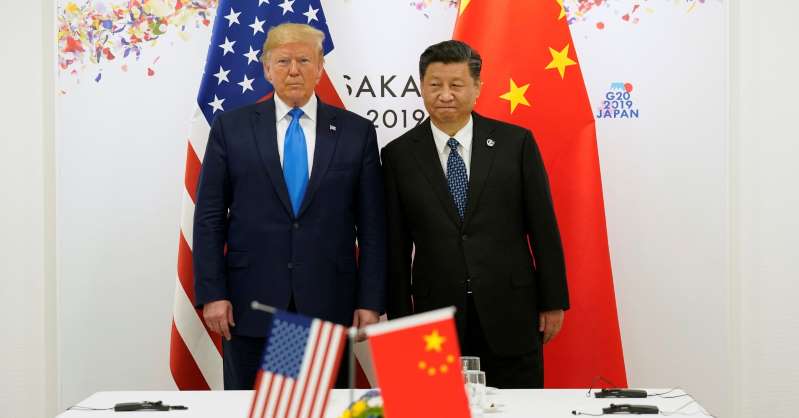By Fred Imbert, CNBC–
- As of 5 a.m. ET Monday, Dow Jones Industrial Average futures implied a gain of 260 points at Monday’s open. S&P 500 and Nasdaq 100 futures also pointed to gains.
- Those gains prime Wall Street to start the second half of the year with a bang following a big first half. The S&P 500 rallied more than 17% to start off 2019, notching its best first half in more than 20 years.
U.S. stock futures surged on Monday morning after the U.S. and China agreed to hold off on slapping additional tariffs on their products in an effort to resume trade talks.
As of 5 a.m. ET Monday, Dow Jones Industrial Average futures indicated a gain of more than 260 points at Monday’s open. S&P 500 and Nasdaq 100 futures also pointed to gains.
“The markets appear to be content with the cooperative tone coming out of the meetings. To me, it felt like the contrarian play was to the upside post meetings,” said Dan Deming, managing director at KKM Financial. “There was a great deal of bearishness in sentiment headed into the meeting. Many market observers were discounting any change in the narrative, which made many believe the risk was to the downside.”
Those gains prime Wall Street to start the second half of the year with a bang following a big first half. The S&P 500 rallied more than 17% to start off 2019, notching its best first half in more than 20 years.
That surge came after stocks recovered in June from a torrid May performance. The Dow soared 7.2% in June, its biggest gain for that month since 1938. The S&P 500, meanwhile, jumped 7.9% for the month, marking its best June performance since 1955.
President Donald Trump and Chinese President Xi Jinping agreed not to impose new levies on U.S. and Chinese goods after meeting on the sidelines of the G-20 summit in Osaka, Japan on Saturday.
Trump said the meeting went as well as it could have, noting: “We are right back on track.” Chinese state-run news outlet Xinhua said the two leaders agreed to “to restart trade consultations between their countries on the basis of equality and mutual respect.”
Trump added the U.S. will ease restrictions on American companies from selling products to Huawei, a giant telecommunications company from China. The U.S. barred companies from selling to Huawei in May, citing national security concerns. The U.S. president also said China would “buy farm product.”
Reversing the Huawei ban could boost chipmaker shares like Skyworks Solutions, Qorvo and Micron Technology, all of which have revenue exposure to Huawei. Skyworks and Micron were both down at least 10% for 2019 through Friday’s close. Qorvo was down 16.9% year to date.
Investors anxiously awaited the meeting between Trump and Xi as they looked for clues on whether the world’s largest economies would resume trade negotiations or if the conflict would be prolonged.
Chetan Ahya, global head of economics at Morgan Stanley, described the meeting’s outcome as “an uncertain pause.”
There is “no immediate escalation, but still no clear path towards a comprehensive deal,” Ahya said in a note Sunday. “As things stand, we lack clarity on whether real progress was achieved on the sticking points that caused talks to break down in the first place. Hence, our overarching conclusion is that the developments over the weekend on their own don’t do enough to remove the uncertainty created by trade tensions.”
Comments from Larry Kudlow, director of the National Economic Council, added to the uncertainty around U.S.-China trade relations. Kudlow told Fox News on Sunday that Trump was not granting Huawei “general amnesty. ” He also said there is no timetable for when a deal might be finalized.
The lingering uncertainty around U.S.-China trade relations will continue to dampen the outlook on corporate earnings, said Larry McDonald, editor of The Bear Traps Report.
“There’s a substantial decay factor developing inside the S&P 500′s earnings picture,” McDonald said. “CFO’s cannot make decisions with a purgatory of uncertainty, endlessly … hanging over the market. The equity rally is a screaming sell.”
Calendar second-quarter earnings for the S&P 500 are expected to fall on a year-over-year basis, according to FactSet data. Analysts also lowered their third-quarter earnings forecast to show a contraction from the previous year, as profit expectations for multinationals with exposure to China have soured.
China and the U.S. have been embroiled in a trade war for more than a year. In that time, the U.S. has slapped tariffs on more than $250 billion worth of Chinese imports. China has retaliated with levies of its own on U.S. products.
In economic news, ISM manufacturing and construction spending data are expected at 10 a.m. ET.
—CNBC’s Michael Bloom and Everett Rosenfeld contributed to this report.


Leave A Comment
You must be logged in to post a comment.